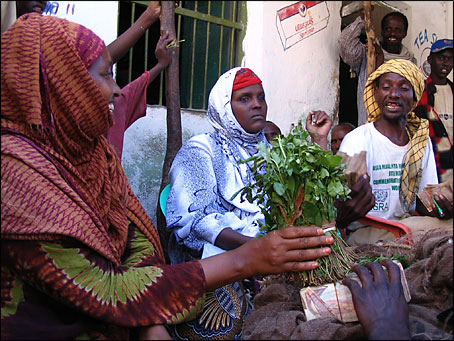 |
| Maryann Ali, left, a khat dealer in Wajid, was a teacher before the Somali government fell in 1991 and the schools were closed. Emily Wax |
Page 2 of 2 < Back
"Several major factions and authorities have a direct stake in the business, either through partnership with khat importers or by levying charges and taxes at points of entry," according to the report.
Khat chewing also suppresses appetite. It had long been an urban habit, with most rural farmers typically too poor to buy it, but humanitarian workers say that men moving from the farms to towns are starting to pick up the pastime, borrowing money to support the habit.
 |
A 34-year-old khat user who says he loves the feeling khat gives him; it keeps him awake. Chewing khat can be socially acceptable in a country where drinking alcohol is not. (Emily Wax)
|
"Every meeting we have with the Somali community, khat is identified as a major problem that's getting worse," said Regine Kopplow, a project officer in health nutrition with the U.N. Children's Fund in Somalia. "People don't know what to do. There is drought. There is no feeling of safety. There is real depression. It ends up hurting their children, who lose out on school and food."
Ali gets her daily supply of khat from her clan's warlord, one of two who control khat in Wajid, a dusty town 200 miles northwest of the capital, Mogadishu, that has drawn thousands of villagers because of the drought.
"I just don't see a better way," she said in a raspy voice recently as she sat in line with other female sellers under a thatched roof market.
As the women thumbed through stacks of cash, Ali cradled the fresh and leafy branches packed in wet burlap sacks on her lap. She wrapped and unwrapped them to show to buyers, as though displaying precious jewels. Her best khat sells for $15 a bundle. She usually sells 20 bundles a day and keeps about 20 percent of the profit, a hefty sum in a place where many people survive on less than $1 a day.
"I feel tortured by this sometimes," she said, rubbing her temples. "My relatives always tell me to quit, but I can't."
Ali's journey to this sweltering market in Wajid followed from the events of her country's downfall. She was born in northern Somalia, but her father, a high-ranking soldier, later moved the family south to Wajid. She became a teacher and married a fellow educator.
"I liked studying the children, seeing how you could learn different human behaviors from them," she said. "Some children were happy and some unhappy. It's actually helped me with this khat work. You have to always watch people and determine their moods."
When Mohamed Siad Barre was ousted in 1991, warlords began carving up the country, schools closed and Ali was suddenly out of work.
|
Video |
The Great Escape
Qat, a plant grown in Yemen that causes a euphoric state in the consumer, plays a dominant role in celebrations, marriages and political meetings. Some men purchase fresh leaves of the plant each day, then join others in a qat session, where they chew the leaves and store them in their cheeks.
|
She and other women she knew took "any job we could find, and khat was it. And it seemed better than becoming a fighter or taking food handouts. I was an educated woman; I couldn't do that."
Her husband plummeted into a depression and couldn't find work, she said. "The man is a vagabond, totally jobless, ah, what are we women to do?" she said, slapping her hands together and then giving the other market women a knowing look. "Men know only fighting and death. Women of Somalia have to be the breadwinners."
She said she has never chewed khat, takes cash only and tries to be "as honest as a khat dealer can," meaning she never sells old khat and tries to keep it from wilting in the sun, she said. But even so, sometimes her job is as dangerous and unpredictable as the country around her.
In December, armed men looted about $3,000 worth of her khat, shooting in the air and then by her feet. She said she thought she would be killed.
She feels sick as she watches more and more rural farmers move into her town and into squalid encampments, where they have only low-lying shelters of sticks and rags to give them respite from the pounding 115-degree heat. Some of the rural women have asked her for jobs. But she refuses most people.
"They keep saying, 'Please give me a few kilos to sell and let me pay you back when the rains come,' " she said. "But I have to be careful. Otherwise, this problem will get out of control."
Amina Saman Mohamed, 37, also a former teacher, works next to Ali in the khat corner of Wajid market. She stopped teaching in 1992 and started selling soon after because, she said, "I had eight children and the schools were closed. There was no other choice and not enough money for food."
She and Ali often talk about their dream of returning to teaching.
"This is our main problem in life: that there is never any real change and we are stuck peddling these leaves," Mohamed said. "That's the way life is in Somalia."
< Back 1 2 |

